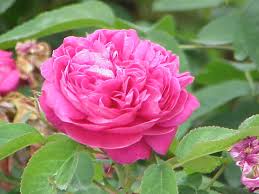
Rosa glauca, with its distinctive foliage and delicate blooms, has been a parent to numerous hybrid varieties that combine its unique traits with those of other rose species. This section explores the hybridization of Rosa glauca, highlighting notable rose hybrids and their distinguishing features.
**1. Hybridization and Crossbreeding**
**Parentage:** Rosa glauca, also known as the Redleaf Rose, has contributed its genetic characteristics to a range of hybrid roses through deliberate crossbreeding with other species and cultivars. This process aims to enhance desirable traits such as flower color, fragrance, and disease resistance while maintaining the plant’s robust growth habit.
**Hybridization Techniques:** Breeders employ controlled pollination techniques to cross Rosa glauca with compatible rose species, including modern cultivars and wild roses. This selective breeding results in offspring that exhibit a blend of parental traits, ensuring a diverse array of hybrids.
**2. Notable Hybrid Roses**
**Rosa ‘Rubrifolia’ (Rosa glauca ‘Rubrifolia’):**
– **Characteristics:** This cultivar showcases Rosa glauca’s distinctive reddish-purple foliage, which intensifies in color during the growing season. Its single, pink flowers appear in clusters and are complemented by attractive red hips in autumn.
– **Uses:** ‘Rubrifolia’ is valued for its ornamental foliage and is often used as a specimen plant in gardens and landscapes. It thrives in full sun and well-drained soil, requiring minimal maintenance once established.
**Rosa ‘Glauca’ (Rosa rubrifolia ‘Glauca’):**
– **Characteristics:** Similar to its parent species, Rosa ‘Glauca’ features blue-green foliage with a purplish tint, providing a striking backdrop to its pale pink blooms. The flowers are followed by small, round hips that add seasonal interest.
– **Uses:** This hybrid is prized for its ornamental value and adaptability to various growing conditions. It is suitable for mixed borders, hedging, and wildlife gardens, attracting pollinators and enhancing biodiversity.
**3. Hybridization Benefits and Traits**
**Enhanced Flower Characteristics:** Hybrids derived from Rosa glauca often exhibit improved flower colors, forms, and fragrance compared to their wild progenitor. Breeders select for traits that appeal to gardeners and landscapers, enhancing aesthetic appeal.
**Disease Resistance:** Incorporating Rosa glauca’s natural resilience into hybrids contributes to enhanced disease resistance, reducing the need for chemical treatments and promoting sustainable gardening practices.
**4. Cultural and Landscape Applications**
**Garden Design:** Hybrid roses featuring Rosa glauca genetics add diversity to garden landscapes with their unique foliage and seasonal blooms. They serve as focal points, borders, or mass plantings, enhancing visual interest throughout the growing season.
**Historical and Modern Uses:** From historical estate gardens to contemporary urban green spaces, hybrid roses derived from Rosa glauca continue to captivate gardeners and horticultural enthusiasts worldwide. Their versatility and adaptability ensure their relevance in diverse garden settings.
**5. Conservation and Future Prospects**
**Conservation Significance:** Hybridization programs involving Rosa glauca contribute to conservation efforts by preserving genetic diversity and promoting sustainable plant propagation. These initiatives safeguard rare and endangered rose species while introducing novel hybrids for future generations.
**Research and Development:** Ongoing research focuses on developing new hybrid varieties that combine aesthetic appeal with environmental resilience. Breeders collaborate across disciplines to advance rose genetics and adaptability in response to changing climate conditions.
**Conclusion**
Rosa glauca’s legacy extends beyond its natural habitats to encompass a diverse array of hybrid roses celebrated for their beauty, resilience, and cultural significance. As a parent species in hybridization programs, it continues to enrich garden landscapes and inspire innovation in rose breeding. The exploration of Rosa glauca hybrids highlights the dynamic intersection of tradition and modernity in horticulture, ensuring its enduring presence in gardens and landscapes worldwide.










